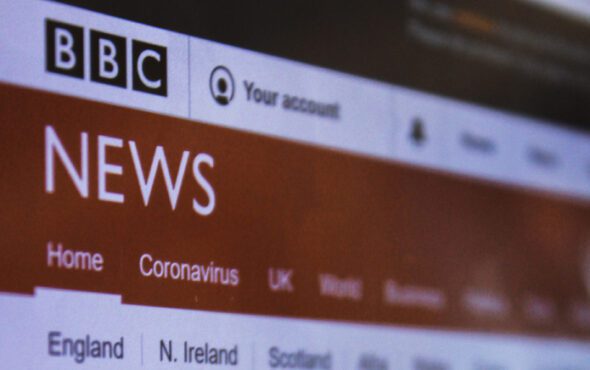
LGBTQ+ staff at the BBC were told to get used to views they dislike in the wake of its employees calling it “institutionally transphobic”.
The comments were allegedly made in a Zoom call with the BBC’s Pride Network on 12 November by Fran Unsworth, the BBC’s head of news, who is leaving the broadcaster in January.
The Times reports that two sources who attended the meeting said the 63-year-old told employees: “You’ll hear things you don’t personally like and see things you don’t like — that’s what the BBC is, and you have to get used to that.”
She continued: “These are the stories we tell. We can’t walk away from the conversation.”
On the same call, Tim Davie, the director-general, told attendees that he was concerned about LGBTQ+ inclusivity at the BBC.
He assured them that he will listen to their opinions and explained that he is concerned about LGBTQ+ staff leaving over the broadcaster’s policies.
A BBC spokesperson told GAY TIMES: “The BBC has regular staff meetings and this meeting was constructive and useful.”
Also on the call was Rhodri Talfan Davies, the BBC’s director of nations, who defended Caroline Lowbridge’s infamous article alongside Davie.
The company has been facing backlash for the piece following its publication on 26 October, which sees Lowbridge attempt to discover how “widespread” the issue of lesbian women allegedly “being pressured into sex by some trans women” is.
Update: BBC bosses held the Q&A session with LGBTQ staff this morning.
One employee told me: “It was an absolute car crash. The bosses spoke a lot – but didn't really say anything. A trans colleague noted we were 40mins in but no trans people had spoken.” pic.twitter.com/CdT3rLkkOO
— Ben Hunte (@BenInLDN) November 12, 2021
She cites things such as social media, people’s opinions and even a survey of 80 people as sources during her apparent investigation.
Lowbridge repeatedly acknowledges the lack of reliable information available, though never clarifies why she decided to write and publish the piece without it.
During the meeting, the two reportedly defended the story by saying it is a good piece of journalism.
However, it was recently revealed that Lily Cade, a lesbian porn star interviewed for and included in the story, has been calling for trans women to be “lynched”.
The BBC opted to erase her contribution on 4 November, adding a statement to the end of it confirming the move and acknowledging that “an admission of inappropriate behaviour by the same contributor should have been included in the original article.”
GAY TIMES is still awaiting comment from the broadcaster on Cade’s remarks and whether or not they were aware of her extremist views and the sexual assault allegations against her prior to the publication of Lowbridge’s article.
Drag Race UK gets renewed for a fourth season (amazing!) by the BBC and in the same breath they are pushing an anti-trans agenda. This is unacceptable. pic.twitter.com/7dVuAlNKEk
— BIMINI! (@biminibabes) October 27, 2021
However, in a previous statement sent to us in response to Bimini Bon-Boulash criticising the BBC for “pushing an anti-trans agenda,” it said that the piece “went through our rigorous editorial processes.”
“It is important that journalism looks at issues – even where there are strongly held positions,” the statement continues. “The BBC is here to ensure debate and to make sure a wide a range of voices are heard.”
On 10 November, the BBC confirmed it had officially quit the Stonewall Diversity Champions programme, citing concerns over remaining “impartial” for its exit.
A spokesperson for the broadcaster sent GAY TIMES a statement following the announcement of the news: “The BBC is fully committed to being an industry-leading employer on LGBTQ+ inclusion. We are proud of our lesbian, gay, bisexual and trans colleagues and we support them to have fulfilling careers at the BBC.
“Along with many other UK employers, the BBC has participated in Stonewall’s Diversity Champions Programme to support our objective to create a fully inclusive workplace. However, over time our participation in the Programme has led some to question whether the BBC can be impartial when reporting on public policy debates where Stonewall is taking an active role.
“After careful consideration, we believe it is time to step back from the Diversity Champions Programme and will also no longer participate in Stonewall’s Workplace Equality Index.
“Being a part of the Diversity Champions Programme has never required the BBC to support the campaigns of Stonewall, nor its policy positions. As a broadcaster, we have our own values and editorial standards – these are clearly set out and published in our Editorial Guidelines. We are also governed by the Royal Charter and the Ofcom Broadcasting Code. Our journalists continue, as ever, to report a full range of perspectives on stories.
“Although the BBC will not be renewing its participation in the Diversity Champions Programme, in the future we will continue to work with a range of external organisations, including Stonewall, on relevant projects to support our LGBTQ+ staff.”
Today's news that the BBC is leaving our Diversity Champions programme comes in the wake of organised attacks on LGBTQ+ inclusion. Ultimately, it is LGBTQ+ people who suffer. Read our full statement: https://t.co/CD3QrFGbMp
— Stonewall (@stonewalluk) November 10, 2021
Stonewall called the news of the BBC’s departure “a shame” but said organisations taking part are free to “come and go depending on what’s best for their inclusion journey at the time.”
Its statement read: “It’s a shame that the BBC has decided not to renew their membership of our Diversity Champions programme, but as with all membership programmes, organisations come and go depending on what’s best for their inclusion journey at the time,” a spokesperson for Stonewall said.
“We will continue to engage with the BBC on a number of fronts to champion support for LGBTQ+ colleagues and to represent our communities through their reporting.”



